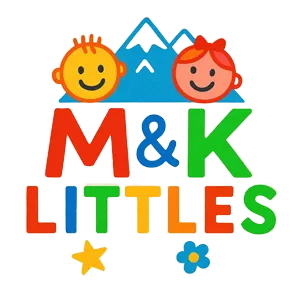The Unique Value of Nature-Based Learning, Montessori, Reggio Emilia, School Readiness, and HighScope in Early Childhood Education
At M&K’s Littles Child Development Center, we believe that early childhood education should foster curiosity, creativity, and independence in a supportive and nurturing environment. Our diverse curriculum integrates several unique teaching styles—nature-based learning, Montessori, Reggio Emilia, school readiness, and HighScope—to ensure a well-rounded and enriching educational experience. Each of these approaches brings distinct benefits to the table, offering a holistic learning journey that prepares children for lifelong success.Have a Question or Want to Join Our Waitlist?
Nature-Based Learning: Embracing the Outdoors
Nature-based learning is a powerful teaching method that emphasizes the natural world as a dynamic classroom. In nature-based education, children explore the environment, learn about plants and animals, and engage in outdoor activities that promote hands-on learning. By spending time in nature, children develop an appreciation for the environment while enhancing their cognitive and physical skills.
What makes nature-based learning unique is its ability to connect children to the world around them. The outdoors serves as a living, breathing laboratory for exploration, where children can observe cause-and-effect relationships, experiment with natural materials, and develop problem-solving skills. Moreover, outdoor learning helps reduce stress and increase well-being, creating a balanced foundation for both emotional and academic growth. The sensory experiences involved in nature-based learning support children’s development in a way that traditional classroom settings cannot replicate.

Montessori: Fostering Independence and Intrinsic Motivation

The Montessori approach, founded by Dr. Maria Montessori, emphasizes child-centered education. In Montessori classrooms, children are encouraged to take ownership of their learning through self-directed activities and exploration. The classroom is equipped with specialized materials that allow children to work independently while developing skills in areas like language, math, and science.
The uniqueness of the Montessori method lies in its focus on fostering independence and intrinsic motivation. Children are given the freedom to choose their activities and work at their own pace, which instills a sense of responsibility and self-discipline. Montessori education prioritizes the development of critical thinking skills, independence, and self-confidence—qualities that stay with children throughout their lives. It is an approach that respects each child’s individual pace and nurtures their innate love for learning.
Reggio Emilia: Learning Through Collaboration and Expression
The Reggio Emilia approach, developed in Italy, is a unique educational philosophy that views the child as a competent and capable learner. In Reggio Emilia classrooms, children are encouraged to express themselves through various forms of communication, including art, language, and play. Teachers act as guides or co-learners, helping children explore their ideas and engage in meaningful projects based on their interests.
What sets Reggio Emilia apart is its emphasis on collaboration and creative expression. Children are encouraged to work together, solve problems collectively, and share their ideas in a community-driven learning environment. The learning process is seen as a social experience, and children’s ideas and questions guide the curriculum. This collaborative approach not only fosters creativity but also enhances social-emotional skills and builds a strong sense of community and belonging.

School Readiness: Building a Strong Foundation for Future Success

School readiness programs at M&K’s Littles Child Development Center go beyond teaching academic skills; they also focus on preparing children for the social and emotional demands of school life. This approach integrates foundational skills such as literacy, numeracy, and communication, while also emphasizing social interactions, emotional regulation, and resilience.
The uniqueness of school readiness programs lies in their holistic approach to preparing children for formal education. By nurturing emotional intelligence, self-regulation, and the ability to work in groups, children are equipped with the tools needed to succeed in both academic and social settings. School readiness ensures that children not only excel in academics but are also emotionally prepared for the challenges of school and life.
HighScope: Active Learning and Structured Exploration
HighScope is a well-known teaching method that focuses on active learning, where children engage in meaningful, hands-on activities. The core of HighScope is the "plan-do-review" process, which encourages children to plan their activities, carry out their plans, and reflect on the results. This cycle promotes critical thinking, problem-solving, and self-reflection, while fostering independence.
The HighScope approach is unique because it blends teacher-directed and child-directed learning. Teachers guide children through structured activities but also allow them the freedom to explore topics of interest. The emphasis on planning and reviewing gives children a sense of ownership over their learning, which builds confidence and enhances cognitive development.

A Holistic Approach to Early Childhood Education

At M&K’s Littles Child Development Center, we believe that each child is unique, and therefore, no single teaching method can fully meet their needs. By integrating nature-based learning, Montessori, Reggio Emilia, school readiness, and HighScope, we offer a comprehensive, dynamic educational experience that fosters cognitive, social, emotional, and physical growth. These methods not only support academic development but also instill important life skills such as creativity, independence, resilience, and teamwork.
Through this integrated approach, we create an environment where children are not only prepared for school but for the world. By engaging children in active, hands-on learning and nurturing their intrinsic curiosity, we provide them with the tools to thrive both academically and personally for years to come.
Parent Testimonials

M&K's Littles has been a true blessing for our family. From the very first day, we felt like part of a loving community.
Karen Sanders

The staff is not only experienced and professional, but they also treat each child with genuine care and attention.
Walter Williams

Our little one has grown so much—socially, emotionally, and academically—thanks to the hands-on learning environment.
Amanda Smith

M&K's Littles is the only place I trust with my child—they create a loving, fun environment where learning comes naturally.
Amy White

M & K's Littles Child Development Center fosters a welcoming, home-like environment where children develop essential skills through hands-on, child-centered learning inspired by HighScope, Montessori, and Reggio Emilia approaches.